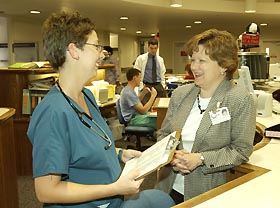|
This is an archived article.
For the latest news, go to the Advance
Homepage
For more archives, go to the Advance Archive/Search Page. |
||
|
Patient
Relations Office Dedicated
To Ensuring High-Quality Service By Pat Keefe
At the UConn Health Center, however, Patient Relations concentrates more on analysis and staff training than on fielding complaints.
The Good of the
Patient The staff perform three main tasks relating to high-quality service:
"We are fortunate to have a patient relations program at UConn," says Dr. Steven Strongwater, director of clinical operations and hospital director. "Most people don't realize what the patient relations office actually does. This is a group of very talented people who are available to address any patient concerns. They resolve problems. By virtue of their unique position, they quickly identify system issues that contribute to patient concerns. Their leadership role has helped us raise all of our patient satisfaction scores throughout the hospital." Attention to
Detail "It's good business but, more importantly, it's outreach and it's genuine," says Bartolotta. "The patients appreciate it and we've had fantastic feedback." Another important detail has to do with personal belongings. Lost or misplaced eyeglasses, dentures, and hearing aids can make a person's stay in the hospital frustrating. Now when patients are admitted, they are given a brightly colored plastic box, like a pencil box, for their personal items. The bright color prevents the box getting lost in the shuffle of dietary pick-up, linen exchange, housekeeping, medication, or rounds. As the number of lost personal items has declined, patient satisfaction scores have increased. Educated
Consumers Her last nursing job was on the bone marrow transplant ward, where patient satisfaction was evident in the numbers seeking treatment in the unit. "Patients are educated consumers today," she says. "They have almost infinite sources of information, and they use them. They want to be cared for professionally and knowledgeably, and they want to be kept informed. They're too smart to just endure." The key to good patient relations is the staff, says Bartolotta, and the tone must be set by their managers. "Staff have to know from managers that they are appreciated and that their good work is recognized," she says. "That work shows up upon discharge in how the patient feels. We must be alert to do anything we can as caregivers to make their stay a better one. That's the essence of patient relations." |
 n the world of healthcare, patient relations offices carry
something of a reputation. Many are seen as places that require
their staff to have infinite amounts of tact and skill to deal with
demanding, trying, or complaining individuals.
n the world of healthcare, patient relations offices carry
something of a reputation. Many are seen as places that require
their staff to have infinite amounts of tact and skill to deal with
demanding, trying, or complaining individuals.
